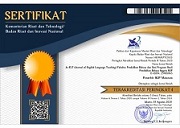THE USE OF TEAM GAME TOURNAMENT TO IMPROVE STUDENTS’ ELT CLASSROOM INTERACTION AND READING COMPREHENSION IN RELATION TO SELF-EFFICACY
Abstract
This research is aimed to find out the implementation of Team Game Tournament to improve students’ classroom interaction and reading comprehension viewed from self-efficacy. The subject of this study was 30 students at second grade students of SMPN 5 Kopang. Which consists of 14 males and 16 females. This study was classroom action research (CAR) with two cycles, each cycle consists of four steps: planning, acting, observing and reflecting. The first cycle was focused on the students’ classroom interaction. Meanwhile, the second cycle was oriented to solve the students’ improvement of reading comprehension. The data gathering used reading test, observation sheet, and questionnaires and analyzed by using quantitative and qualitative approach. The result of the questionnaire showed the students score in the first cycle was 16.86 or 56% and the second cycle showed the students' score was 27.10 or 90.3% indicating the target of 75 of the minimum criterion has been achieved, it means that the action was stopped in the cycle 2. In other words, the students’ classroom interaction and reading comprehension in relation to self-efficacy was improved by implementing team game tournament (TGT) for the eighth-grade students of SMPN 5 Kopang.
Keywords
Full Text:
PDFReferences
Amalia, A. (2013). proposal Classroom Action Research. Retrieved from http://proposal Classroom Action Research (CAR-PTK) ku. Tahun pelajaran 2013_2014 Amalia Aljauhariy.html.
Bandura, A. (1997). Self-Efficacy in Changing Societies. Cambridge University Press.
Bandura, A. (2006). Guide For Constructing Self-Efficacy Scales.
Brassel, D., & Rasinski, T. (2008). Comprehension That Works: Taking Students Beyond Ordinary Understanding to Deep Comprehension. SHELL Education.
Burns, A. (1999). Collaborative Action Research for English Language Teachers. Cambridge University Press.
Chesla, E. (2002). TOEFL (Test of English as a Foreign Language) EXAM SUCCESS In Only 6 Steps!. New York: Learning Express.
Effendi, A. (2018). The effectiveness of fishbowl technique towards students’ self-efficacy in speaking. JOLLT Journal of Languages and Language Teaching, 5(2), 46-51. https://doi.org/10.33394/jollt.v5i2.345.
Faradillah, N. (2018). The effectiveness of mind reading game in teaching. JOLLT Journal of Languages and Language Teaching, 5(2), 77-83. https://doi.org/10.33394/jollt.v5i2.362.
Haerazi. (2017). Genre-based language learning model in teaching writing skills for English department students, International Conference, 109 (Aecon), 108–111. https://doi.org/10.2991/aecon-17.2017.22.
Haerazi, Irwansyah, D., Juanda, & Azis, Y. A. (2018). Incorporating intercultural competences in developing English materials for writing classes, Journal of Language Teaching and Research, 9(3) 540-547. http://dx.doi.org/10.17507/jltr.0903.13.
Haerazi, H., & Irawan, L. A. (2019). Practicing Genre-Based Language Teaching Model to Improve Students’ Achievement of Writing Skills. IJELTAL (Indonesian Journal of English Language Teaching and Applied Linguistics), 4(1), 9-18. http://dx.doi.org/10.21093/ijeltal.v4i1.246.
Helmi, M. (2018). The effectiveness of vocab acrostic strategy in teaching vocabulary mastery. JOLLT Journal of Languages and Language Teaching, 5(2), 71-76. https://doi.org/10.33394/jollt.v5i2.360.
Isjoni, H. (2009). Pembelajaran Kooperatif: Meningkatkan Kecerdasan Komunikasi Antar Peserta Didik. Pekanbaru: Pustaka Belajar.
Johnson, A.P. (2008). Teaching Reading and Writing: A Guidebook for Tutoring and Remediating Students. United States of America: Rowman & Littlefield Education.
Lukitasari, P. (2012). Learning English for the Second Language. Retrieved from http://learningenglishforthesecondlanguage.blogspot.co.id.
Marzuki, A. G. (2018). Developing students’ reading skill s on islamic texts through SQ3R method in an EFL class, Register Journal, 12(1), 49–61. http://dx.doi.org/10.18326/rgt.v12i1.49-61.
Sabri, M. Z. (2018). The effect of two picture game towards students’ speaking anxiety. JOLLT Journal of Languages and Language Teaching, 5(2), 62-66. https://doi.org/10.33394/jollt.v5i2.353.
Schunk, D. H. (1995). Self-Efficacy, Motivation, and Performance. Journal of Applied Sport Psychology, 7(2), 112-137.
Slavin, E. Robert. (2005). Cooperative Learning Teori, Riset dan Praktik. London: allymand bacon.
Sugiyono. (2010). Statistika Untuk Penelitian. Bandung: Alfabeta.
Syafii, M. L. (2018). Using online short stories to improve the reading comprehension ability, Register Journal, 11(2), 123-138. https://doi.org/10.18326/rgt.v11i2.168-191.
Taufik, L.A.M. (2016). The Effect of Team Games Tournament toward Students’ Motivation in Learning Vocabulary. Unpublished. IKIP Mataram.
DOI: https://doi.org/10.33394/jo-elt.v6i2.2359
Refbacks
- There are currently no refbacks.
Copyright (c) 2019 H. Ruslan Abdul Gani

This work is licensed under a Creative Commons Attribution-ShareAlike 4.0 International License.
Jo-ELT (Journal of English Language Teaching) Fakultas Pendidikan Bahasa dan Seni Program Studi Pendidikan Bahasa Inggris IKIP is abstracted/indexed in the following databases:
Published by Faculty of Culture, Management, and Business
Universitas Pendidikan Mandalika
p-ISSN: 2355-0309 | e-ISSN : 2548-5865
email: [email protected]
 Jo-ELT (Journal of English Language Teaching) Fakultas Pendidikan Bahasa dan Seni Program Studi Pendidikan Bahasa Inggris IKIP is licensed under a Creative Commons Attribution-ShareAlike 4.0 International License.
Jo-ELT (Journal of English Language Teaching) Fakultas Pendidikan Bahasa dan Seni Program Studi Pendidikan Bahasa Inggris IKIP is licensed under a Creative Commons Attribution-ShareAlike 4.0 International License.





1.jpg)


.png)







1.png)

.png)








